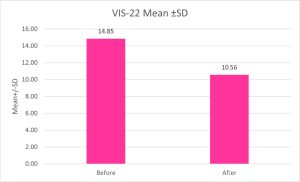
ABSTRACT
Background: Vitiligo vulgaris is an autoimmune de-pigmentary disorder characterized by skin depigmentation that can be localized or generalized, due to destructed melanocytes. It carries a majority of stigma and has a negative impact on patient’s psychological well-being. Hence, to determine the impact of clinical pharmacist intervention on depression levels and quality of life in vitiligo patients is of utmost importance. Materials and Methods: A prospective study in Dept. of Dermatology at a tertiary care hospital was carried out after getting ethics committee approval. Vitiligo patients aged ≥18 years were included. The QIDS-SR16 (Quick Inventory Depression Symptomology-Self Rating Scale) and VIS-22 (Vitiligo Impact Scale-22) scales were used to determine depression level and quality of life, respectively. Results: Among 62 patients enrolled in the study, 64.52% were female and 35.48% were male. At the baseline, the mean VIS-22 and QIDS-SR16 scores were 15.02 and 4.92 respectively. After the pre and post evaluation of VIS-22 and QIDS-SR16, a significant percentage of difference from the baseline data to the follow-up of approximately 40.64% in VIS-22 and 53.27% in QIDS SR16 was observed. Conclusion: The findings of this study indicate that, in addition to pharmacological therapy, appropriate counseling and general education can aid in enhancing their psychosocial behavior and quality of life and help improve the negative stigmatization in society.
